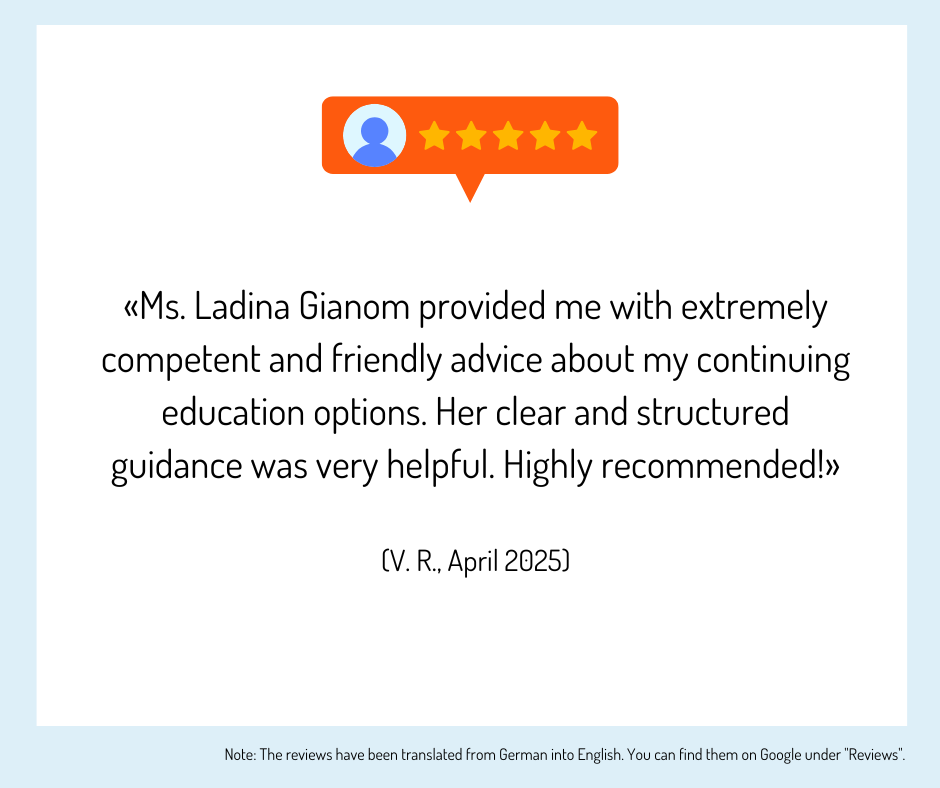Complementary therapist (certified) (Reinach):
1 Provider - 1 Training locations
Training providers in your region
Sites in the region Basel and Reinach:
Education location / Reinach schools
Questions and answers
Can I also obtain a federally recognized diploma as a complementary therapist?
Since 2015, the examination regulations have been approved by SERI, the State Secretariat for Education, Research, and Innovation SERI, and now make it possible to obtain a federal diploma as a complementary therapist.
What do you learn in continuing education, further training to become a complementary therapist?
Continuing education, further training to become a certified complementary therapist provides comprehensive specialist and practical skills. The aim is to provide clients with holistic guidance and individual support using a recognized method of complementary therapy. The content is carefully tailored to the requirements of the complementary therapist job profile and includes
- Training in the chosen complementary therapy method
In-depth practical and theoretical training in a recognized method such as craniosacral therapy, shiatsu or kinesiology. - Conventional medical principles and emergency management
Basic medical knowledge of anatomy, physiology, pathology and how to act safely in emergency situations. - Social science basics
Introduction to psychology, communication, ethics and social and intercultural contexts. - Occupation-specific basics
Reflection on the professional role, legal aspects, professional ethics and professional action in everyday therapeutic practice. - Mentored practical work
Practice-related learning phases with support from qualified specialists to develop professional identity. - Written work
Documentation and reflection of one's own learning and development process and therapeutic work. - Self-awareness (at least 24 hours)
Personal examination of one's own attitude and impact in a therapeutic context. - Diploma thesis
Independent thesis on a relevant subject with practical relevance.
This course content promotes the development of a professional, reflective and method-guided therapeutic practice. They enable a responsible entry into a growing professional field with high social relevance.
Please note: The specific course content may vary depending on the school. It is recommended that you enquire about the exact course content directly with the respective school. An inquiry can be sent directly to the desired school using the contact form.
What are the methods of complementary therapy recognized by the OdA KT?
The methods of complementary therapy recognized by the OdA KT are (as of March 2024)
- Acupressure therapy
- Alexander technique
- APM therapy (acupuncture massage therapy)
- Aquatic bodywork
- Respiratory therapy
- Ayurveda therapy
- Movement and body therapy
- Biodynamics
- Craniosacral therapy
- Eutoni
- Fascia therapy
- Feldenkrais Therapy
- Eurythmy therapy
- Kinesiology
- Polarity
- Rebalancing
- Reflex zone therapy
- Rhythmic massage therapy
- Shiatsu
- Structural integration
- Trager Therapy
- Yoga therapy
Do the industry certificate courses for complementary therapists take place on a part-time or full-time basis?
Depending on the school, the courses for the OdA KT industry certificate take place at different times of the day, so please check the exact dates directly with the individual providers for continuing education, further training to become a complementary therapist. The courses are often offered in several blocks or two-day courses, rarely as full-time training.
What does the training path to become a complementary therapist look like?
For many interested people, the training path to become a complementary therapist is unclear. Training to become a complementary therapist can be completed in many different methods, such as craniosacral therapy, shiatsu, yoga or breathing therapy, all of which are classified as complementary therapy. As a rule, you complete a basic course in the chosen method. This allows you to find the method that suits you best. The individual methods are then combined to form the Tronc Commun courses. The Tronc Commun course teaches the basics of conventional medicine, psychology and profession-specific principles such as ethics, human nature, marketing and therapeutic communication. The training generally takes at least 4 years, as it is very extensive and is usually completed alongside the profession. The intermediate qualification is a specialist certificate. An internship is also part of the training in order to internalize and apply what has been learned. The goal of the training in complementary therapy is the federal qualification, i.e. the Advanced Federal Professional Examination (AFPE), after which you are awarded the title of federally certified complementary therapist.
What skills and responsibilities do you have after completing the HFP complementary therapist course?
After training as a complementary therapist HFP, you will have the following skills and responsibilities:
- Competencies
- Sound method-specific knowledge
- Leadership skills with own practice
- Communication skills when advising patients
- Responsibilities
- Advice and support for clients
- Company management with own practice
What personal requirements should a complementary therapist have?
Complementary therapists should meet the following personal requirements:
- Willingness to undergo continuous further training
- Communication skills
- Empathy
- Physical and mental resilience
What requirements do I have to fulfill to train to become a federally certified complementary therapist?
In order to be admitted to the Advanced Federal Professional Examination (AFPE) "Complementary Therapist with Federal Diploma", interested candidates must have a degree at upper-secondary level or an equivalent qualification as well as the industry certificate of the Organization of the Working World of Complementary Therapy (Oda KT). In addition, at least two years of professional experience in complementary therapy with a workload of at least 50 percent in the last two years prior to registration or three years of professional experience with 30 percent professional activity in the last three years must be proven. In addition, 36 hours of supervision with approved supervisors in the last two to three years before registering for the examination.
How do I become a federally certified complementary therapist?
The path to becoming a complementary therapist with a federal diploma leads via the KT industry certificate, supervision, professional experience and passing the Advanced Federal Professional Examination (AFPE). A preparatory course can be very useful as support for the examinations.
What further courses can be attended after the complementary therapist training?
After the complementary therapist training, the following advanced courses can be attended:
- Courses and offers from training providers accredited by the OdA KT
- Specialization in specific target groups such as
- Infants
- Children
- Teenagers
- Occupational groups exposed to risk
- Specialization in specific complaints
- Consequences of stress
- Consequences of an accident
- University of Applied Sciences
- Bachelor/Master of Science (FH) in Osteopathy
- Bachelor of Science (FH) in Nutrition and Dietetics
What tasks can be performed thanks to the complementary therapist training?
Thanks to the complementary therapist training, the following tasks can be performed:
- Complementary therapists respond empathetically to the needs of clients and support them in developing their own personality.
- Complementary therapists design the therapy process in a method-specific way with interactive touch, movement, breath and energy work. They specifically challenge the self-regulatory powers of their clients. They convey new physical experiences and initiate self-awareness and recovery processes.
- Complementary therapy therapists work mainly independently and on their own responsibility, but are also employed and work as part of an interdisciplinary team, for example in a health or rehabilitation center, in hospitals or clinics.
- The title of complementary therapist with a federal diploma can be obtained by therapists with an industry certificate KT in various methods of complementary therapies.
Tips, tests and information on "Complementary therapist"
Experiences, evaluations and opinions on training / further education
Haven't found the right training or further education yet? Benefit from educational advice now!
Further training is not only important in order to maintain or increase professional attractiveness, investing in training or further training is still the most efficient way to increase the chances of a pay rise.
The Swiss education system offers a wide range of individual training and further education opportunities - depending on your personal level of education, professional experience and educational goals.
Choosing the right educational offer is not easy for many prospective students.
Which training and further education is the right one for my path?
Our education advisory team will guide you through the "education jungle", providing specific input and relevant background information to help you choose the right offer.
Your advantages:
You will receive
- Suggestions for suitable courses, seminars or training programs based on the information you provide in the questionnaire
- An overview of the different levels and types of education
- Information about the Swiss education system
We offer our educational counseling in the following languages on request: French, Italian, English
Register now and concretize your training plans.

Attraktive Services für Swiss Post Mitarbeitende
Kostenlose Services
» Bildungsberatung (Wert: CHF 150.–)
Bildungs- und Businessratgeber (Wert: CHF 175.–)
» Rabatte
Attraktive Rabattierungen seitens der Bildungsanbieter.
Massgeschneiderte Bildungsangebote
Ohne grossen Zeitaufwand den besten Trainer, Coach oder Schulungsanbieter finden
Bildungsangebot Schweiz
Aus über 700 Bildungsanbietern das richtige Bildungsangebot finden




